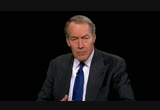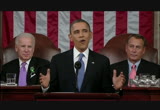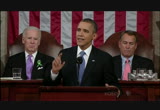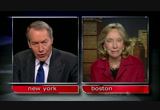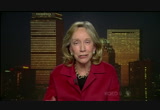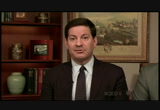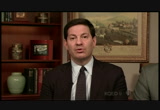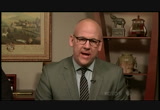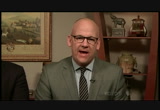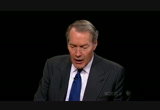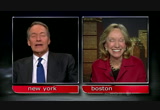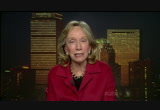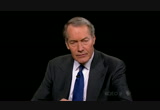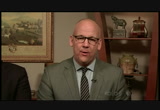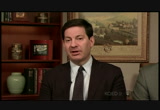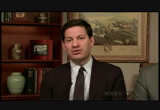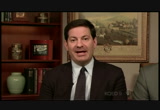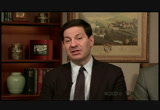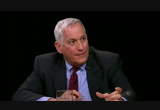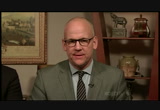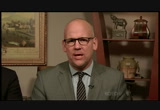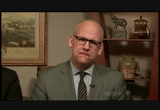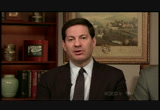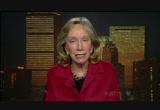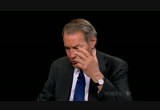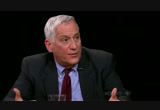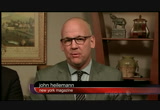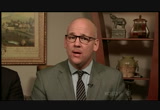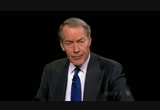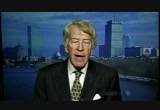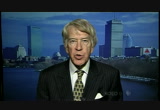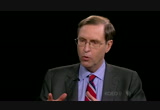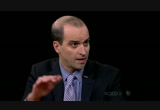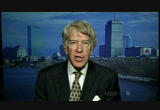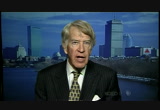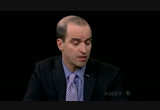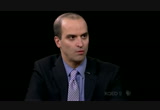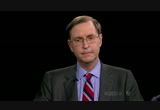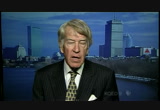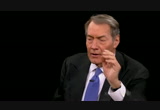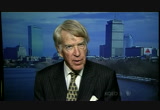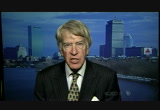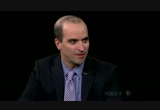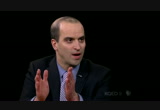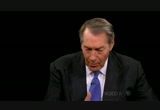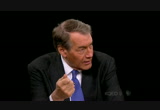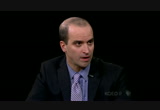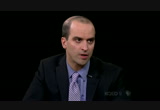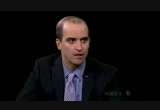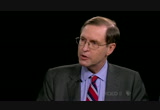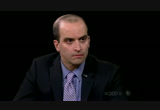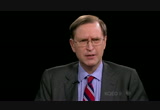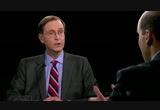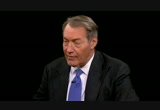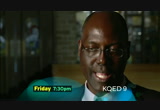tv Charlie Rose PBS February 13, 2013 12:00am-1:00am PST
12:00 am
in the aftermath of sandy hook. he sought his vision for a stronger middle class. he spoke of immigration reform, raising the minimum wage and energy independence. quoted john f. kennedy 1962 speech saying the substitution makes us not rivals for power but partners for progress. you agenda he made few concessions to republicans. it remans to be seen whether the president can break away from the bitter partisanship and dysfunction of his first term and whether he can strike the grand bargains the country needs. >> the greatest nation on worth cannot keep conducting its business by drifting from one manufactured crises to the next we can't do it. [applause] let's agree, let's agree right here right now to keep the people's government open and pay our bills on time and always uphold the full faith and credit of the united states of america.
12:01 am
our economy is stronger. when we honor else the talents and ingenuity of striving hopeful immigrants. and right now, leaders from the business labor law enforcement faith communities, they all agree that the time has come to pass comprehensive immigration reform. now is the time to do it. know is the time to get it done. if you want to vote no, that's your choice. but these proposals deserve a vote. graduations, anniversaries have been stolen from our lives by a bullet from a gun. our actions will not prevent every senseless act of violence in this country. in fact no laws, no initiatives, no administrative argues will perfectly solve all the
12:02 am
challenges i've outlined tonight. but we were never sent here to be perfect. we were sent here to make what difference we can. to secure this nation, expand opportunities, uphold our ideals through the hard, often frustrating but absolutely necessary work of self government. >> rose: joining me from washington mark halperin from "time" magazine, your honor heilemann of "new york" magazine and msnbc, from boston doris karyns good minute and from new york walter sigh sackson and ceo of the aspen institute. i go first to boston and doris kearns goodwin. here we have the first state of the union, the president seemed to be different and outline the different vision in otherwise inauguration and in here he provided some of the details. what did you think, doris. >> what it shows is the state of the union is the chance for the prepared to be that one national
12:03 am
voice. everyone else sitting in the audience, he's up on the stage. one of the reasons why woodrow wilson -- he decided to argue his role not bigger or smarter no longer ronald reagan the government's the problem not the solution. no longer even bill clinton saying the era of big government is over. by saying that he was going to act executive action if congress didn't act. and seeming very reasonable even though he wasn't combative, he was arguing to the country i think even more to the congress. and then he did have some refrains in there that got a lot of applause. i remember in 6 5 lbj say how many times did they applause me. he understood the need for refrains and he came back to what he talked about in his inaugural, the role of citizens which mean he's trying to mobilize the country to put pressure on the congress to do the things he wants done. >> rose: walter what did you
12:04 am
see as the theme of this statement. >> i thought it was a great continuation of the inaugural thing, which is inclusiveness and opportunity. that's the theme of our nation and that's what really separates his agenda, i think from some of his opponents which is we want to bring everybody in, we want there to be ladders of opportunity, doors of opportunity. and the fact it had a thematic connection to inaugural, that it is a place where opportunity and inclusiveness as opposed to being out for yourself, that's his vision of what the country should be. >> rose: mark hall terrain and john heilemann in washington. mark first, how did you see i. >> i think the president as walter just said definitely followed on what he had done in the inaugural address and i think he was as close to a clinton-type speech, a bill clinton-type speech as i thinky seen him give, a nice over arching sense how his policy fits together, to some extents
12:05 am
program matt gree. the challenge for the president is tonight's speech did not i think do anything obvious to expand the number of americans in the categories of americans who are willing to follow his leadership. i think the faithful loved it, the democrats in the hall loved it, i think the people who voted for him loved it. did he get the business community to be willing to follow him, did he get any republicans in congress to be willing to follow him. anyone who didn't vote for him voted for governor romney the jury is out on that for a while much he's governorring like clinton from the left towards the center. i don't think there was very much if there was one thoracic in the speech i think was a missed opportunity he's got to look for opportunities to star in the center and try to bring people on the left and right along with him. i don't think he achieved that but again over arching thematic i think as good a speech i've heard him give to give a sense of what he wants to do with this job. >> rose: john. >> well, i start by saying charlie i think this was the best state of the union address the president's given. the people around him for the
12:06 am
last couple days have been saying the speech would be a book end to the inaugural address. and they would have a big focus on the economy. there's no question that he talked a lot about, a lot more about the economy and about jobs in this speech than he did in the inaugural where he didn't talk about it hardly at all but i thought that part of the speech was something that seemed much on of a traditional state of the union. the first half of the speech an economic focus was incremental and a little laundry listee. the thing that stood out were programmatic expansion of things he talked about at the inaugural. i give a lot of space to climate change and energy, something he did not talk about for the first four years. he talked about it at the inaugural and a lot tonight and of course at the end of the speech which was really the emotional high point of the speech, the refrains and the choruses around begun control. one of the most stirring states
12:07 am
of the union any president has given. and he got applause from the democrats and republicans. whether that will earn him votes he was saying over and over again they deserve a vote it's less clear but the thing the speech will be remembered for. never been a state of the union talking about gun violence at all the way the president did tonight and it's where his passion clearly was and what he really wants to fight for. >> rose: do you believe, you suggest you don't know whether the momentum from newtown to this speech will carry over. what does he have to do to reach out and get those people who he wants to come on board for gun control. where does he have to go to close the deal? >> well if you're asking me charlie, i think it's going to be hard, this is another, it's going to be a lot of it is down to congress. he's going to have to continue to put his shoulder into this in the way he did tonight. and tonight is a big sign he's not about to walk away from this fight. one of the biggest themes of the
12:08 am
speech to me overall, everything that he did the first half the more program matic half and the more liberal progressive bills he tried to do was the theme that that kind of implicit theme was of congressional add vocation. he kept coming back implicitly and actually telling could not it's time for you to do your job. and in that sense it was a quite confrontational speech institutionally. he was in many cases saying i've had good plans on the table here, you guys need to come up and leg now. he has to go out and put pressure on congress and what he thinks is their institutional responsibility. >> rose: do you believe as was written in the "new york times" that this president following the election is more competent, is more aggressive really seems to be of a differ temperment than the first term
12:09 am
president walter. >> i think you saw this pivot from going to crystal crises defining everything to a real vision, a vision that's not shamed by a fiscal crises but shaped by jobs and opportunity. that's fining the confidence in his footing. i think he threw out a very big idea that hasn't gotten much time which is preschool for every kid in america. that's an important idea for which he will be remembered if he can push it through. and i suspect he will be able to push it through. >> rose: i suspect all the thing he tries to do education is a place where there's really action and some interest on that across the boundaries and he gets some credit. dorothy -- doris. >> don't you remember me anymore. >> rose: yes i do. is there an element of this man about boldness that presidents that you have lived with have expressed? >> i think there's no question
12:10 am
that the experience of having gone through the last four years and then having one re-election has given him inner strength now to decide okay here i am. he's learned in those four years unless he mobilizes the pressure from the country from the outside in he's not going to get anywhere. he tried, he thinks he tried in those first four years. even though the tone wasn't combative i agree with what was said. the idea underneath his reasonable tone was congress, you have to do something. and i'm going to try and tell the citizens to keep you on your job. and i think he learned that from these four years. and you see a president i think who knows that maybe that first election was pretty exciting and maybe it was a fluke but this election showed that he's got something that he can go forward with. i makes a huge difference when it's re-election. i think it changes who they are when they've got another shot at it. >> rose: you've written about lincoln in the sense that lincoln tried to learn from the
12:11 am
mistakes of his first term. >> there's no question. lincoln put all of his rivals into his cabinet in that first term because he needed them to shore up his own inadequacies. by the second term they were gone and he could have the people saw vowbding him whom he knelt comfortable with. he was able to make the decisions he wanted to make. it only makes sense, no one can be president until they are president and especially if you come in with not that much experience as both lincoln and obama did, now you know you learn from that the most important thing we got to figure out in the second term is how much do they learn from their mistakes and their strength in the first term. the boldness he's showing that's his decision that's what he's learned and we'll see if that works. >> rose: john heilemann what do you read as the people he's chosen for his national security team how he sees his second term on that front. >> well gosh charlie, that's a, it's obviously a team that's gone through its turmoil. there was turmoil around the question whether susan rice will be secretary of state. he decided not to put her
12:12 am
forward. there's turmoil now around chuck hagel. this is, people have pointed out, this is a bunch of seasoned white guys, they are a team that's nothing like as star studded as the team he had in his first term. again i think that reflects to some large extent the degree of something doris was just talking about was the president has swayinger right now and a lot of confidence. and forepolicy, he's kind of outsourced foreign policy in the first term. he's insourcing it back in the whitehouse again. this is his foreign policy and he's running into controversy over the drone program right now. this is a foreign policy national security team that is much more implementers and not super stars in their own right. barack obama has got ownership. he doesn't seem to support the kind of cast he had four years ago. >> rose: mark halperin when you looked at the possibilities
12:13 am
of dealing with republicans especially the sequester question, is there some sense that the administration kneeling confident has pulled it off? >> i'm more pessimistic about it than i've been since probably the president took office. these other issues -- >> rose: since he was re-elected. >> no, since he took office. put these other issues on the table. gun control and climate change. i don't think there's any chance of those move until and unless he gets a fiscal deal in part because the traffic won't bear other big big things. and also because i don't think you can get those things through without the kind of trust that will come from working the bipartisan if they k immigration has a chance i think to move on a separate track. it's clear the president's sick of these fiscal battles, it's pretty clear from the lines he's drawn that the gaps that have existed and divided the party still exists. the president wants more new revenue. republicans say you've done revenue, we're done with new
12:14 am
revenue. if the proceed knew tonight about the sequester and trying to say this is congress' fault he knew republicans were going to say your administration proposed the sequester and you signed in law the cuts. i don't see the grand bargain, i don't see a great path to dealing with any of these things. the can's going to be kicked down the road and you're not going to get the kind of deal you would get to build the kind of trust not just between the parties in washington but on the part of business. we dealt with some uncertainty with the first fiscal cliff deal on taxes but if you talk to business people they all say the same thing we need more certainty and know what washington's going to do on corp. rates and individual rates on tax policy for investment and all the things that are still aiming in the balance and i think that's the biggest danger. he wants to help the middle class with a lot more economic growth worried or not putting washington in a place to help facilitate that. >> rose: is he making the decision he can't deal with
12:15 am
business or can't bring them on board or he can't deal with the republicans and can't bring them on board so he's going to confront them. >> there are three tracks. one is his outside group he addressed them tonight at the big conference hall after the state of the union. lots of presidents have tried grassroots. this is a bigger more sophisticated effort as best i can tell than any's done. two he's trying to get things through the senate. there's a lot more going on behalf the surface in the senate besides talks of taxes and spending deals much more than reported much more than what's going on in the house. i think he had some hope of deals in the senate on immigration and maybe on guns. put pressure on that. and finally i think there is a school of thought that people whisper about here in the city which is he's going to spend two years trying to draw lines just like he did in the real act and hope that the last two years of this last term he gets back control of the house, keeps control of the senate and finds a way to deal with these issues in a bartson way rather than bay partisan. >> rose: you can do anything in the last two years of your
12:16 am
term because the attention is on the election of 2016. >> historically it's not the best possible but to paraphrase the president, we've never had a president before named barack obama and he's defied lots of things. right now, you know, it's common, it was common in the end in the first term to say if you took the politics out of it, john baron -- been without the personalities and complexities of the policies of the house with the democrats and republicans and the senate they are too fundamentally at odds how to get new revenue the balance between taxes and tax reform and spending cuts and where they should come from i think as i said before they're farther apart on specifics and on anything that they've been. >> i agree. >> rose: go ahead. >> i think that what is the long term hope here in a certain sense on the part of the president is that even though history will say you can't get anything done in those last two
12:17 am
years you're going to lose in the mid terms that maybe he just can keep that election base going, keep that campaign strategy alive and maybe maybe have a chance to take back the house. and i think it's worth that. if you don't do that, i agree, i don't know how much you get done given the current strategy that's going on within the two parties. and meanwhile you've educated the country at the very least in terms of what's necessary for climate change or gun control for immigration reform. but if you should win and if you should possibly take back the house, the key party took it over because they mobilized from the outside in so it's not impossible to imagine. then you get everything the whole ball game. it's worth a risk. >> rose: go ahead. >> well, first of all i think you said something very truthful tonight which is long term fiscal problems are healthcare costs. if you could just get people to focus on that. they are making a dent and healthcare costs.
12:18 am
i think that's going to be a be a way to get something done. i'm a little bit more optimistic than what everybody else seems to be saying. >> rose: about what. >> about the fact that you're probably going to get some immigration, you're going to be able probably to do corporate tax reform. i do think these a lot going on in the senate that can be done. and i think he's been very effective that mobilizing, even on gun safety i suspect you'll get some things on that. >> rose: john, do you think he's a differ man now so that when we talked early about whether he's more aggressive or more confidence. will he be different, is he different do people you nah him say he's different. >> that's not a simple answer to that charlie. i think there's one side of him and a lot of us tonight have been alluding to this. the president like a lot of second term presidents he knows he's never going to have to stand for election again and there's an element of liberation that he clearly feels. he's pursuing some policies that he i think felt constrained from
12:19 am
pursuing in the first four years with the need to get re-elected looming. and i think there's, as i say when you have a sense he's a little bit unbound, he's a little built unshackeled a spring in his step and a certain kind of swagger to him styleally. what has not changed and i don't know that there's any way for it ever to change. the perennial complaint in washington for the last four years have been that barack obama is not like bill clinton. he's not even like george w. bush. he doesn't care about the schmooshing size of politics. and not just the schmooshing of matters and stuff he just doesn't want to talk to anybody. we've heard this a million times. i don't the that's going to change. he's not suddenly going to become the guy who is like bill clinton, who is either twisting arms or slapping backs. that's just, i've seen no change to that effect. i think that is deeply rooted in his character. i think if anything getting re-elect has lessened the incentive for him to change that way. he's come to a determination you
12:20 am
never really thought it mattered and i think he really now thinks it matters going forward and he does believe in this outside game. i think hi grit es lesson of the last four years is that most of the time when he tried to play the inside game in washington it didn't necessarily work to his advantage. even when he got things through salutively and the campaign infrastructure setting up outside of the white house and trying to do grassroots mobilization to not shoes the campaign infrastructure the technology the sophistication they have and to build from the out side to really do things in that way, mobilize the outside game. i think that is what he believes is the path to progress. >> charlie. >> rose: yes, mark. >> i think the president is remarkably consistent and i think in a second term he's kind of a fixed piece. the big changes for me, there's a new chief of staff a new secretary of treasury new
12:21 am
secretary of state new secretary of defense. how all these people fit together as big parts of saying how the operation works. and i think the biggest piece was also a constant in some ways but his role that's fluctuated is the vice president. you talked to members of congress even republicans particularly in the senate and they will say we just don't have contact with the president, we don't have a feel for the president to be able to move things or stick with the agenda. they have great confidence in the vice president and great confidence in the vice president's ability as he showed in the last couple deals at the end of these lame duck session. if he's thinking of running in 2016 those are variables that could fluctuate. barack obama is constant in his personality and temperment and his approach. >> rose: we've had long discussions as you know mark about whether he doesn't believe it produces results or whether he emme doesn't like it. i don't believe it produces
12:22 am
results. if he listened to fdr and he listened to lincoln and he listened to lyndon johnson, would he approach these things differently, would each of them have the same message which is that he has to do this or else he will not achieve the results that he wants to achieve. >> i any he has to do two things. one is i do think that he should do more to at least bring the democrats into the whitehouse more. maybe he can't reach the republicans, he tried to and he couldn't but he has to make sure his base in the democrat parties the guys in the congress and senate and the house will go with him when he needs them to go. let them come over to the whitehouse as often, use the white house as a tool but he needs to get out of washington more in these next four years than he did in the first in order to keep that base mobilized. i'll bet you see him going out to the country more than he was able to do in the first four years but it has to be a dual approach. in the doesn't work for the republicans definitely make sure you get every democratic vote
12:23 am
before you even go forward with some of these ideas. >> rose: the republican message came from marco rubio the senator from florida. here's a sample of that. >> president's in both parties from john f. kennedy to recalled reagan have known our free enterprise economy is the source of our middle class prosperity. but problem, he believes it's the cause of our problems. but the economic downturn happened because our government didn't tax enough, spend enough or control enough. and therefore as you heard tonight, his solution to virtually every problem we face is for washington to tax more, borrow more and spend more. >> rose: i'll talk about the political implications of marco rubio but what do you think of what he said and his presentation and the strength that he seems to be gaining by being a significant republican voice. >> i think it's important he's trying to say we don't have to be an exclusive party, we can be
12:24 am
a party that brings other people in. but there was a very very clear ideological divide between what he said and the president said. which is that the president believes and he's made a really good case and one election on it, there's a lot we can do together to make a better middle class economy, to help with jobs and help grow that sort of thing and rubio's saying no that's not what the government should do. and i think the president will end up winning a battle in ways because he can go out, it's not about the inside game i don't think it's about convincing a broad section of americans that yes we deserve a vote on guns, we deserve a vote on immigration, we want to do job conversation, we want to do better education. and i think that making that case as he does around the country, it will be a stark contrast to the rubio response. >> rose: what's happening within republican party that may make them john heilemann more
12:25 am
amenable because you saw eric cantor at aei make a speech in which he talked about a whole series of issues that he thought the republicans had to be more attuned to the voters in terms of how they viewed social and economic issue. >> well i mean charlie, look you think about the coalition the president put together in 2012. it's the coalition of the ascendant forces it's minorities and college educated white minute and ma lineal voters. those are the groups that are expanding and they are the part that at least in peedual elections right now democrats are dominating. what the president's trying to do going forward is to solidify that political coalition, make it an enduring one. the democrats can build off for years to come. the republicans sees that's a huge problem for them. the democrats could be a national dominant national governing party even if they're not necessarily dominant at the congressional level or in large parts of the country.
12:26 am
and you see republicans reacting to that. so marco rubio moving on immigration. chris christie embracing gun control, bobby -- going out and repeatedly seizing the bull by the horn criticizing the party, using the stupid party language he's used since election day. those recognitions of the demographic realities of the country and the head start the democrats have on those demographic quadrants that are growing, those are the factors that are going to make the republican party change if any do but i will say that it cannot simply be a matter of image in branding for republicans to be able to get -- they're going to have to change on policy. we're seeing a lot more in terms of image than on substance so far. we'll see what happens over the course of the next couple years. but marco rubio most of his speech tonight still sounded pretty much immigration aside like mitt romney's plat form from 2012. and that is not necessarily a winning national plat form for
12:27 am
republicans going forward. >> the interesting thing about the coalition you're are just speaking about is that statistics show that overwhelming majority of that young millennium hispanic coalition believes and-a-half government at least obama is moving in the trend where that young coalition is moving as opposed to where ronald reagan created a generation of supporters who really were against government and followed him. it seems there may be a tide in that turn and the republicans will have to figure out how to do with that. >> rose: from doris thank you, mark thawrks walter thank you. as we close this off and have an economic discussion following that i taped earlier today, we have not talked about foreign policy. the president is soon off to israel. there are questions about what will happen in syria. a whole lot of range of issues. we will discuss those this week. now we leave you for a conversation about the economy.
12:28 am
joining me is david, he's the washington bureau chief of the "new york times." his new e book is called here's the deal washington can solve the deficit and spur growth. he's at the columbia business school and economic advisors during joarnlings w. bush's first charym. robert altman served as deputy treasury secretary during president clinton's first term. let me begin with roger altman in boston. we're taking this before the state of the union address but the economy's not going to change that much between now and then. and i assume you have an idea of what the president is going to say. was it important for the president to say? >> well, i have not seen the speech charlie, but i would like to see a pathway to agreement on the tax and spending issues which have preoccupied
12:29 am
washington now for the ug long es period in the past three months and facing us with the sequester of the continuing resolution and so forth. do i expect to see that pathway in other words in the real world? i don't. i think the presidencies himself as riding high. he won the election decisively. he got a deal on his terms as the whitehouse sees it on the fiscal cliff. he got the republicans to retreat on the debt limit. i don't think the republicans are going to play with government shut down either and so the presidencies himself riding high it seems to me and he sees the republicans in a disorganized and back on their heels and he's going to press that and will be an inaugural address we know what is a clairn call to progressive values and progressive program goals. >> rose: what would you like to hear the president say.
12:30 am
what do republicans want to hear the president say. >> i think every american wants to hear the president talk about economic growth and job conversation. >> rose: that's what he's focusing on. >> he says that but the pivot would have to be toward longer term spending restraint. i say that because otherwise his budgets are a massive tax increase on all middle income americans going forward. i don't think he wants that. so i think the question to follow up is simply will the president pivot toward longer term spending restraint or lee continue to talk about more taxing. >> rose: because the whole speech i think is dedicated to the middle class that the middle class, having them grow will in fact be the key to economic prosperity. >> i agree. but that can't happen without the longer term deficit reduction for two reasons. one, if we can't get the budget under control, we're going to have to raise taxes sharply on all americans. not just on high income americans. and second, if we don't, we're going to crowd out every other kind of spending on education on defense on training that effects the lives of all of us. >> rose: do you think they'll
12:31 am
reach some kind of temporary agreement on sequestering so they can postpone another three months. >> i doubt it. i doubt it. >> rose: so looking at what you've heard so far, do we need to have a temporary focus on growth? less spending cuts. and delay the sort of formal attack on the debt for two or three years to get growth under control or with growth released. >> we support of got three major long term problems. the deficit, growth and i would put climate change in that same category. your question suggests the more immediate problem is economic growth more so than the deficit. the deficit's come down a lot of and will continue to come down. unemployment isn't coming down that much and isn't forecast to come down. given how low interest rates are right now i do think economic growth is a bigger challenge.
12:32 am
i think beyond that i think democrats who are suggesting that the deficit actually isn't a problem at all and we don't need to worry about are going too far. but if you think about sort of a rank order of problem economic growth which then makes the deficit worse because slower growth leads to a higher deaf. >> rose: i've heard some people say that the president doesn't think spending is the problem. >> well, i wouldn't go that far charlie but i do think the whitehouse is sending signals that deficit reduction is not the top priority right now. and it's possible to interpret those signals as saying that they don't need as they see it, to do any more deficit reduction during this second term. i don't know whether that will turn out to be the case and i don't think the whitehouse would accept that formulation for obvious reasons. but it may be that that's their
12:33 am
real view but i agree with dave that the priority's short term should be growth but i would ad that the cheapest form of stimulus is an increase in confidence. consumer confidence and business confidence. and if there were to be an agreement, for example, on the sequester an agreement which replaced it with an equal amount of deficit reduction more balanced than the whitehouse wants between revenues and spending but an agreement that does not just delay the sequester and permit more talking. a after all we've been talking about all for two and-a-half years since simpson-bowles that would be a big boost to confidence and more than overtime the fiscal drag that's associated with having that deficit reduction continue. so in effect, that would be a strong stimulus, and i think a lot of people are missing that point. >> i think there's a bigger boost to confidence. i agree with roger but i think
12:34 am
we need to get a longer term deal. the need america has for austerity is not today. i agree with david we don't need a sharp contraction today. what we need is a glide pat -- path for the -- we need growth and longer term os -- if we really wanted to promote confidence we would signal to the american people we're going to do something about the projectory of social security and medicare spending. >> the place where there's most agreement between the president and the republican is so social security interesting enough. the president has signaled he's not interested in medicaid cuts he thinks the program is already stretched he's not interested in raising the retirement age. he's signaled a real clear willingness to change this technical formula that really is a benefit cut to social security. so you could imagine at some point we get to some kind of deal that includes changing that
12:35 am
social security formula maybe some defense cuts that aren't as big and as across the boards as the ones in the sequester and maybe closing some tax loopholes. we actually get some sort of medium term deal on this but we're not there yet. >> rose: you're the bureau chief of the "new york times." do you have a sense that they will in enact do this deal? i mean you got a lot of reporters reporting to you saying this is what we believe. >> well you see you had the president's former advisor on the show and he made an important point which is we're not likely to get the grand bargain which ever of everyone comes out and says we got the deal but we have slow pieces of the default. in 2011 we had the deal almost all spending cuts we had a deal this year that was almost all tax increases. so you can imagine if you put together a few more, you might get something that when you look back on in a few years and you say do you know what that didn't solve our problems but we're not going to solve all our problems now given the issues with health costs and the baby boomer retirement.
12:36 am
the republican congress and the obama administration made a lot of progress. they could still get there. >> i would say they've made some progress. a lot is pretty extravagant. i would think pivot towards tax reform and entitlement reform is absolutely necessary. >> rose: what kind of tax reform. >> simpson-bowles comes to mind. >> rose: you have members of the tea party on the house support bowles simpson. >> keep in mind romney exainld on marginally lower tax race for the bolles simpsons level. bod thing the base and lowering the rates is not a foreign sound that conservatives use. >> rose: what kind of tax reform would you like to see. >> i like the framework of simpson-bowles but i don't think simpson-bowles itself has a gols
12:37 am
of -- ghost of a chance. >> rose: why is that. >> let me explain. when people think about converting the mortgage interest deduction, the charitable deduction, the state and local tax deduction to pick the big three into credits, which reduces enormously the value of those deductions. that type of effort would be analogous to the 1986 tax reform act which took four years from introduction to completion. it did not raise revenue and it also occurred in a sym plush age and with some of the great masters of the game like jim bakker and dick darman or requests trait -- orchestrating it -- even though it's the right objective. >> corporate tax -- sorry. >> that may be the whitehouse's first prior actually rather than individual tax reforms. >> the scenario where democrats and republicans come together
12:38 am
much more. here's the important thing to remember roger just hit on this which is simpson simpson-bowles increase -- it's a great grand bargain. deficit reduction plans at the end of the day are some combination of tax increases and spending cuts. tax increases on you and spending cuts that affect you are not popular, right. and that is sort of, that's how we've gotten ourselves into this problem. it's not simply a matter of spineless politicians although i wish we had more courage as politicians and it's not just a matter of waist although i wish we had less waste but they don't want to raise taxes and cut security benefits and at the end of the day that's the way we get ourselves through the deficit. >> rose: then there's medicare. roger before you go, we have to get control of even though it's better than we thought of healthcare cost. how do we do that?
12:39 am
>> well, that's one of the reasons i'm ambivalent about the quest ter -- at another level both sides hate it so much if it actually starts and gets going for two must not or three months possibly it's the wedge that drives a real agreement which involves both additional revenue probably through deduction reform on a small scale, and dealing, and entitlement reform the biggest piece of which is medicare as you just said. but right now if you watch closely, the whitehouse is not prepared to put entitlement reform back on the table. i mean the president laid out a proposal about two weeks before the fiscal cliff. they're not prepared to put that back forward at least in public because their base doesn't like it and because they don't think the republicans are prepared to do their half of the bark -- burg
12:40 am
bargain -- when does the sequester start and carve everybody up for a little bit might be what is necessary to bring people to the table on that. >> rose: you used to come to this table and talk about a value added tax. you still talk about a value added tax? >> i still think that a progressive consumption tax or value added tax emphasize on the word progressive would be a good step for this country because if you look at the long term deficit forecast in both glen and david touched on this, let's assume for the moment the sequester or an equivalent amount of deficit reduction occurs all we done is stabilize the d of gdp ratio to 6 or 7% for the next eight years and then it explodes again. there's no scenario under which he we aren't going to have to as david said raise revenue pretty substantiately and i think a good way to do that would be
12:41 am
either a carbon tax and/or a progressive. we're a long way from that. if you think simpson-bowles is hard an added tax would be excruciating. you can't count anything out because the size of the problem. >> rose: thank you roger i know you have to leave. thank you very much for joining us from boston. there's a piece in the paper about the president in the "new york times." how he's different this time. tell me what is the, what's the conventional wisdom in washington as to whether the president's mine set is affected in part by the inauguration and also signals he sent to another. >> this is the column you're talking about. if you're thinking about being a first term president glen is sort of -- you have to think through much of the time you're just sitting there waiting to have the voters deliver a verdict on your performance. and think about what obama dealt with in his four years when you
12:42 am
just think about the economy crashing and you think about everything that went on overseas all the mistakes they made, all the successes they had. and to have that verdict delivered, you can really almost physically see in some sense of pressure lifting off of him. you do see him be somewhat more confident. you see that more reflect life in his dealings with republicans. but even less so than confident it's more than just confidence it's more of a sense of relaxation that he still has a lot of things he wants to do. not only does he not face the voters again but these huge sweeping changes he put in place the expansion of health insurance above all. it's almost certainly now codified as the law of the land. the supreme court upheld it. he's won re-election and you have a sense that the range of out comes for his presidency has anywhere hold -- narrowed in a way somewhat that he seems satisfied. >> rose: i think because he wants to do both things i assume that he wants to get past this. and because he doesn't have to
12:43 am
face re-election again and because the idea of saying what you're prepared to do about especially medicare is important to gain some kind of understanding with republicans. >> oh you desperately wants to get past this i think you're right and i think that's why you've seen both he and john boehner pursue these grand bargains and they couldn't get to a deal. there were talk in liberal circles they were very glad that boehner or eric cantor walked away from that big deal because in many ways it was a deal that skewed more conservative than you would expect from a president. and i think that fact, you're saying obama december pruft -- desperately wants to get past this. >> rose: and all of that casts simply the thing that sort of are build in to affect the economy but need to be getting past so he can unleash the economy. >> there's another way to do
12:44 am
that. you take social security an area i agree which is most obvious for agreement. you could do progressive benefit growth slow downs in social security that just benefits more for the well to do should be out of the president's play book. it also is out of the republican's play book. and by taking one very large budget item and fixing it, you have a lot of room to move in the near term to change the channel to other things, that should be an obvious solution. it's not nearly as difficult as medicare because it doesn't involve the whole healthcare market and it would be a great place to start. i'm surprised the president doesn't see it because it's a way to be progressive in deficit reducing at the same time. >> rose: the administration has signaled they want to do something about job creation, something about climate, something about infrastructure. and something about manufacturing. are you with them on that? i mean, aren't those ideas that you want to persure some things to great a competitive economy in place where the global
12:45 am
economy and placement is central to your cess. >> well they are but they somewhat unrelated to many of the president's own policy. so for example, manufacturing the best thing we could do for manufacturing are reduction in the corporate tax rate and litigation reform. those are not likely to be on offer tonight. on infrastructure the biggest play in the country is on energy but that of course depend on regulatory changes that the president has not signaled a strong interest in. so i hear the words but they're not yet matched by the administration's actions. >> rose: what do you think about it. >> i think one of the things glen mentioned tax reform for manufacturing. it comes back to this issue of part of the problem with tax reform that it hands winners and losers almost by definition. the tax reform would help some manufacturers and not help others. i'm not sure tax reform is the main thing holding back american manufacturing right now but i agree that -- >> rose: in manufacturing. >> i think and i'm guessing glen agrees with think think the slow down in educational attainment in this country has left us with
12:46 am
a work force than what we might otherwise have. >> rose: if there's a board of director pool of skilled workers manufacturing would be more a larger part of the economy today. >> i think so. i think it could be more competitive if you look over history skilled workers have been a huge part of our great -- >> rose: so therefore the president says we want to focus on education which is one of the things. and part of that is to focus on producing skilled workers who might not necessarily have the educational background others have in the past. >> that's right. it should be a four year college graduates. some will work in manufacturing two year college graduates people with certificates all kinds of things. if you look over the last 30 years women have continued their educational progress in some ways it's accelerated and men have all but stopped their educational progress not quite but it's slowed down. that creates a problem unemployment rate for college greats is 4% for everyone else it's 8%. >> the department of labor programs -- if we're serious
12:47 am
about community college or more individualized training that would require rethinking of policy. i doubt we're going to hear the president talk about that. >> i think they've done a lot more interesting thing in the department of education than they have at the department of labor. >> i would agree with that. >> rose: your book is called here's the deal, how one can solve the deficit and spur growth. do you believe they will. i'm not saying how. >> i guess i'm an optimist. i think they'll get there the most likely scenario is they'll get there circuitousity with two steps back and three steps forward bud i think it's hard not to look at the long history of this country and not be an optimist. i think it's hard not to look at the relative position of this country relative to others and not be an optimist. we have huge problems i just mentioned our education. we've got deficit about other countries have bigger ones. when you look what a magnet this country remains for immigrants. if you look did he spite the slow down our highest levels of education is still the best.
12:48 am
if you look at all kinds of strength this country has rule of law infrastructure. i think our problems are imminently fixable. it's easy in a moment like this just to focus on the negatives but there are positive in the u.s. economy. we started to make some progress both on growth and on the deficit. health costs are starting to come down. we're no where near there. no where near there. but i think you can imagine with how we make some good decisions over the next few years and beyond. things really could improve over the next decade or two but it's not guaranteed and that's the important thing. >> rose: going off on a tangent for a second. we all are affected by what happens in europe. what's happening in europe. >> we're seeing a austerity be date too much of a focus on near term. >> rose: if i could interrupt it seems to me os tearity lost the debate. >> it's the wrong kind of austerity. what europe needs and the u.s.
12:49 am
needs is a glide path not a growth reducing rude in branch near term austerity. of course you have too arm the coordination problems and regulation and banking making it even hard he but i think we've missed the austerity to date there and i worry in the u.s. you're too focused on things like sequester and near term changes and that at all on the real threats that you're a few years out. >> rose: the interesting thing to me about washington today, they're like children is that i would do that but i won't do it because if i do it you'll take advantage of me. it will not lay out he feels strongly -- he clearly believes entitlements have to be reforms and he's got some support but he's frightened if he does that the republicans will not come around. >> charlie the way we solve that in other aspects of life is we change the rules. we bind ourselves we tie ourselves to mass. we need a different set of
12:50 am
budget rules so that the two sides don't have this incentive. i agree with everything david said about optimism about the american economy but i am much less optimistic about america's political system and budget processes with changes in rules. >> rose: what do you mean about changes in rules. >> give you a simple example. what if we said every year we're growing to do like a business and put on a budget the change in the accrued liable fees and entitlements programs and tell the congress they will have to raise taxes or cut some other spending every year. force the trade off. the harshest rule to be to amend the constitutions looking at some balanced budget. short of these things we're not going to make progress beyond three months and six month periods. >> rose: is it easy to say there's too much focus on discretionary spending. >> yes. >> rose: don't the republicans talk more about discretionary spending. >> most conservatives talk a lot of about entitlement programs. but the long term issue really
12:51 am
isn't about discretionary spending, honey deed the problem is we're going to crowd it all out and have a nation of social security and welfare and not education defense research and other legitimate functions in government. >> rose: you're talking like a democrat now. >> all these years in new york. if you're looking for optimism -- one is more willingness to work with the administration having lost the election. two is i think you see this a little bit of a switch from republicans moving from discretionary spending to talking more about entitlements. and i think that is a good switch because i think republicans -- i mean, you can argue that it will be much better to have a sequester that applied to everything that this sequester doesn't apply to which is to say titlement in taxes which instead we have a -- >> rose: when you saw this with eric cantor and others and rubio leading on immigration reform you saw eric cantor
12:52 am
talking about the fact we recognize, we have been speaking to, where the american people are. beyond demographics, it's the language. we care about your needs etcetera etcetera rather than we want to cut out everything. >> connecting the dots. it turns out long term deficit are reduction is in the interest of today's middle class. but you have to connect some dots and simply saying lets cut the budget is not sufficient. >> rose: which makes me wonder whether we need better explanation because i trust the common sense of the american people. do we need more explanation which maybe is a role for the "new york times" and others and teaching people in the business school. somehow are we doing our jobs so that people are able to apply their own instinct and common sense to what's necessary and demand it of politicians. >> i think one of the best examples of that is when you give people straight up choices about how to solve the deficit they basically don't solve the
12:53 am
deficit. you did that once. an excellent idea. give people a spreadsheet. >> thank you, yes. >> pull these and see. >> if you tell them and give them restrictions you say well you can't just leave taxes where they are and you can't cut taxes you have to do a mix then people do -- i agree there's a huge role for education and information in all of this. >> rose: the e book as i said by david is called washington can solve the deficit and spur growth. dean of the columbia business school chair of economic advisors. captioning sponsored by rose communications
12:58 am
captioning sponsored by wpbt >> this is n.b.r. >> susie: good evening, everyone. i'm susie gharib. tom's off tonight. americans are waiting to hear from president obama as he gives his state of the union speech. we look at his jobs plan and what wall street wants to hear from the president. and currency wars: g-7 countries say they're looking to boost their local economies, but critics say they're aiming to get ahead by weakening their currencies.
12:59 am
that and more tonight on "n.b.r." we're hours away from president obama's state of the union address. americans aren't just listening for what he says but how he says it. will he strike a hopeful or optimistic tone, and will he offer a concrete plan to create jobs and grow the economy? washington bureau chief darren gersh reports. >> reporter: with more than half of americans thinking the economy is still in recession, it makes sense that the president is focused on a jobs agenda in his speech tonight. but while his plan may be new, the challenge is not. >> the economy is not growing fast because the demand for the goods and services that we can produce in this country has not increased very much. and unfortunately, the public sector purchases of consumption items and investment items has been incredibly weak compared with earlier recessions. >> reporter: state and local spending on roads, buildings and bridges has hit a seven-year
133 Views
IN COLLECTIONS
KQED (PBS) Television Archive
Television Archive  Television Archive News Search Service
Television Archive News Search Service  The Chin Grimes TV News Archive
The Chin Grimes TV News Archive 
Uploaded by TV Archive on

 Live Music Archive
Live Music Archive Librivox Free Audio
Librivox Free Audio Metropolitan Museum
Metropolitan Museum Cleveland Museum of Art
Cleveland Museum of Art Internet Arcade
Internet Arcade Console Living Room
Console Living Room Books to Borrow
Books to Borrow Open Library
Open Library TV News
TV News Understanding 9/11
Understanding 9/11